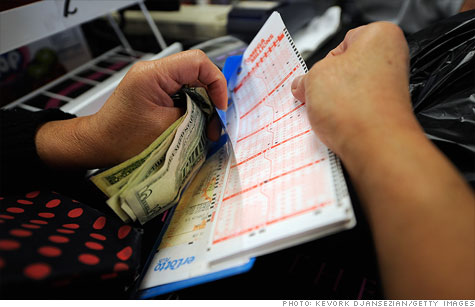
Fewer lottery tickets, more money.
NEW YORK (CNNMoney) -- You are not going to win the lottery.
Sure, somebody might cash in that $640 million Mega Millions golden ticket, but odds are, every single reader of this story will come away disappointed.
The odds of winning the jackpot are about one in 175 million. Talk about a low probability event!
"The odds are crazy if you think about it," said Romel Mostafa, a professor at the Ivey School of Business. "Especially the mega lotteries. It's just nuts."
Playing the lottery is a massively popular $50-plus billion business. It is the most widespread form of gambling in the country. But it's also an exceedingly bad bet.
Research shows that the lottery pays out at one of the lowest rates among commercial gambling games.
The curse of the lottery
In 2009, 42 states had lotteries, with total ticket sales of $52.3 billion, according to the Census Bureau. But prizes added up to only $32.3 billion, while states retained $17.7 billion as revenue.
Mega Millions aside, certain states are marginally better than others if you're hoping to score.
According to data crunched by Bloomberg, Georgia residents are the biggest "suckers." They spend an average of $471 per year on the lottery, or 1% of their average income, while receiving a payout of 63 cents on the dollar.
Massachusetts residents spend more, but their state lottery also provides bigger returns -- 72 cents per dollar played.
States, many of which routinely face budget shortfalls, are happy to get the money. Depending on state law, the revenue raised from lottery sales is used to fund all kinds of government programs, including education.
Earmarking the money for popular causes makes the state look great, but as the National Gambling Impact Study Commission said in the late 1990s, it is not necessarily boosting budgets.
"There is reason to doubt if earmarked lottery revenues in fact have the effect of increasing funds available for the specified purpose," the report said.
In other words, the money often acts as a stop-gap replacement, not a supplement.
How to divide the jackpot
Lotteries were once prohibited in the United States, but have spread like wildfire since they were introduced in the 1960s. In each case, state governments have maintained a monopoly over the game.
State governments often label lottery proceeds as "profit." But another way to think about the lottery is as a tax.
After all, the government is collecting revenue from a population that willingly purchases a product -- like a sales tax. The only difference is that the tax is built into the price of the lottery ticket, instead of tacked on at the end.
Another frequent complaint about lotteries is that they act as a regressive tax, as numerous studies have shown that lottery games are disproportionately consumed by the poor.
"The poor tend to spend more as a share of their income," Mostafa said. "And that is sad. These are the people who are cash-strapped."
No comments:
Post a Comment